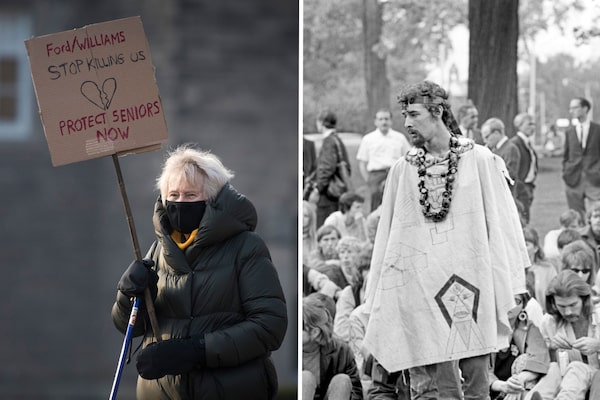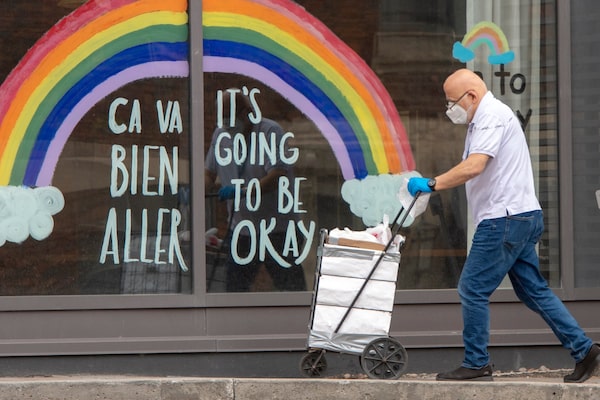
Queen’s Park in Toronto, generations apart: At left, a protester during 2020’s COVID-19 pandemic demands action for seniors from Premier Doug Ford and Ontario’s chief medical officer of health at the time, David Williams; at right, hippies take part in a mass meeting in 1967.Tijana Martin/The Canadian Press; James Lewcun/The Globe and Mail
Lenore Rowntree is a writer who lives in Vancouver and on the Sunshine Coast in B.C. Her linked short-story collection See You Later Maybe Never comes out in October.
Growing up as a kid in the 1960s, I really loved my paternal grandmother. She wore old lady shoes, a pair of thick black Oxfords. She had shaky legs – Parkinson’s will do this to a person – and a soft voice. She smelled of a beautiful mix of lilac and lily of the valley. And I especially loved that she sheltered me from my raging lack of confidence by reminding me that I was as good as anyone.
Were it not for her, I think I would have melted down as a teen, in the scrum of trying to pass for what was considered popular at my high school. I wore strawberry lip gloss and paisley miniskirts like all the other girls, but I messed up the look with my suede desert boots and runs in my diamond-pattern stockings that I got from riding my bike to school, all those years before grunge. A bicycle was definitely not an in thing in those days; there was never trouble finding a space in the rack to stash it, and locks were not necessary. Eventually, though, I ditched the bike in the futile pursuit of what was cool.
Lenore Rowntree.Handout
Yet, despite my love for my grandmother, what also stands out in my memory was a moment in which I was cruel to her.
One day, during my decidedly uncool years, I remember following my grandmother up from her cellar, where we’d watered the paper white and the hyacinth bulbs that she forced in the wintertime on the basement’s darkened shelves beside her two cement laundry tubs. As we came up the stairs, I grew impatient as I watched her shoes and her shaky legs mount the steps in front of me. I muttered: “Hurry up, Grandma. You can go faster.”
Maybe she tried to quicken her pace. But whatever did happen, something made her stumble on one of the steps, and in the end, it took us even longer to get upstairs. I remember being angry by the time we landed in her kitchen, with its turquoise clock and table. I remember it as the first time I was rudely impatient with an old person – the first time I thought, in the callowness of my youth, that I was right: Old people were a waste of time.
Soon after, I began to think being old meant bad breath, being slow and out of it, having chin hairs, being hard to look at. This was, after all, a time of peace, love and flower power, and all of that was rooted in a feeling of individual and invincible glory. It was a time in which being young was to be celebrated, and when we all believed our youth would last forever.
But now, looking back, I wonder if those feelings only sowed the seeds of future distress for my generation, which have sprouted today. Because little did I understand then that I, too, would one day get old.
Now that the day is here, I am finding myself almost disappointed for where I’ve arrived, in the face of stigma from both younger people and my own generation. Worse, during the pandemic, getting old has meant becoming part of the comorbidity contingent, the people most at risk who were clogging the hospitals and taxing the health system. Now, ageism can be seen everywhere, from the bouncer who called me out in a club lineup for being too old to go inside to see the indie band I was waiting on, to the conversation around the recent departure of Lisa LaFlamme as the chief anchor of CTV National News; the 58-year-old’s grey hair was reportedly a concern for Bell Media’s then-vice-president of news.
How did we get here? What in my past had allowed this disappointed, perhaps reviled, attitude to form? Why did I see some flicker of inevitable age on the horizon for others, but not for myself, even though the dim light of eventide was clearly gathering behind me all along?

American author Tom Wolfe, shown in 2016, coined the phrase ‘“me” decade’ to refer to the self-involvement of people in the 1970s.Bebeto Matthews/The Associated Press
In August of 1976 – when I was a young university student – the writer Tom Wolfe published his piece “The ‘Me’ Decade and the Third Great Awakening” in New York magazine. It was widely read and stirred a buzz, and from this article and the many knock-offs that followed, the phrase “Me Generation” was coined to define people my age. It was a shorthand way of saying we were a bunch of self-involved narcissists, too short-sighted to ask anything more than “What’s wrong with that?”
Mr. Wolfe’s article opens with a scene from an Erhard Seminars Training (EST) course taking place in the banquet hall of the Ambassador Hotel in Los Angeles.
EST, a pop-psychology phenomenon that attracted professionals and celebrities, ran sessions around the world and asked participants to come alive – that is, to self-actualize and get in touch with their inner selves to become the superstars they really were.
This particular “happening” Mr. Wolfe witnessed was led by a trainer with a deep tan dressed in a white tennis shirt and peach-coloured sweater that the writer describes as “a dynamite color combination, all very casual and spontaneous – after about two hours of trying on different outfits in front of a mirror, that kind of casual and spontaneous.”
Between the 1960s and the early 1980s, these sorts of much-hyped, psychology-flavoured, self-focused events proliferated, and most of these “encounter groups” were part of what became called the Human Potential Movement.
Some morphed into quasi-religions such as Hare Krishna and Scientology; others got mixed up with psychotherapy methods such as Primal Scream or dosing with psychedelic drugs. The Esalen Institute, choicely located in California’s Big Sur region, became the famous model for thousands of copycat retreat centres designed to help people loosen up and find themselves.
Somewhere along the way, we started to believe we could be whatever we wanted to be. To paraphrase the Clairol hair dye commercial that was so popular back in the day: “If I only have one life to live, let me live it as a unicorn.” If being a unicorn is what a person really, really wanted, we were told, all we had to do was focus on the end goal and white-light yourself enough times. (It’s not too far a leap from such nonsense to fake news, and it’s easy to understand why so many people think they are entitled to float their own facts.)
These encounter groups were like a finishing school for the personality. En route to “advancement,” we were told to enhance the best in ourselves and to shed the things we didn’t want.
Along the way, we certainly didn’t think about what it meant to become old, or even how to do it gracefully. Being old was the end of that all-important potential, so being old was powerless and unattractive.
Indeed, Mr. Wolfe notes that “the new life of old people in America in the 1960s was still more astounding. … The Old Folks at Home happily mingling in the old manse with the generations that followed? The little ones learning at grandpa’s and grandma’s bony knees? These are largely the myths of nostalgia. The beloved old folks were often exiled to the attic or the outbuildings. … They were not considered decorative in the dining room or the parlor.”
Since then, many of us have taken the banishment of the elderly a step further. We’ve effectively created warehousing for the old, allowing us to cast them aside where they don’t have to be seen. If an old person is wealthy, they get to move into what’s called a retirement community that looks good, at least in the photos; if they’re not wealthy, well, they’ll live in an old-age dorm where people are stacked like so much cordwood.
We all know where that got us during the pandemic.

A man brings supplies to a Montreal seniors' residence in April, 2020, when thousands died of COVID-19 and neglect in long-term care homes in the province.Ryan Remiorz/The Canadian Press
But why did this happen? It could be because the Me Generation got used to the idea that old doesn’t look or feel right – the bad breath and the chin hairs, for a start – and we wound up smacking ourselves in the crepey wattles by engendering the culture we see today. We didn’t like old when we were young, so we got on with excluding the people who went before us – the ones who provided and cared for us – and by extension, we damned ourselves by setting us up to dislike our own future selves. Perhaps it’s why, even as we slid into the territory of the time-worn, we too easily embraced dehumanizing terms such as “old bat” and “cougar” as descriptors for ourselves.
Some people reading this piece are probably going to think: “Here’s a typical, pushy baby boomer – now that she’s old, she wants everyone to think she’s still chill.” And they wouldn’t be wrong: I would love it if people thought I was still happening. But that’s really not the point. The point is that the Me Generation needs to somehow help itself back to a place of respect, to forget about the crepe-paper skin and the sagging eyelids, and to model pride in our age, inside and out. And we should do this not just for ourselves, but for the next generations. We need to be a generation who has something to give, not just take.
To that end, we need to acknowledge that we haven’t been very good role models. Future disrespect of self as an old person is a terribly destructive model.
So the beat goes on. As insouciant as some members of Gen X, the millennials, Gen Z, and even Gen Alphas (really?) may be about the elderly today, they too will soon enough be old. Ideas around self-realization, self-fulfilment, self-discovery and all the other forms of self-aggrandizement that were launched by the Me Generation – and were honed in the decades that followed – really do have a lot in common with the little minnow called selfishness.
So to my fellow boomers: Let’s be the leaders out of this selfish stew. Let’s stop glancing backward to whatever greatness we perceive went before. Forward is hard for everybody, but we have to listen for the whisper of what someone else needs to move us in the right direction.